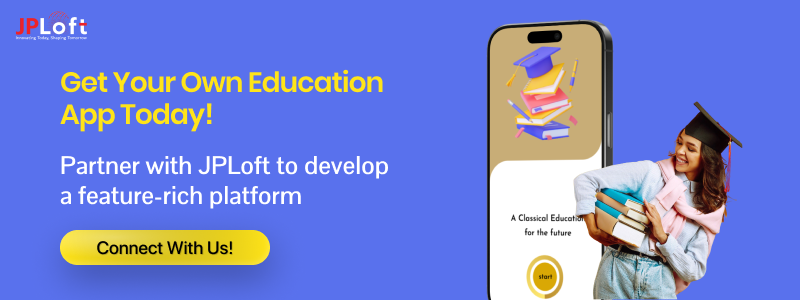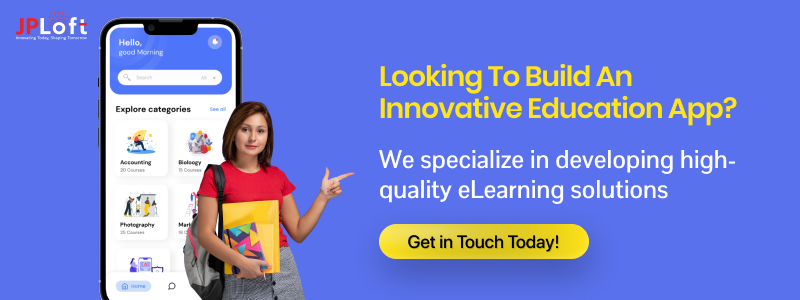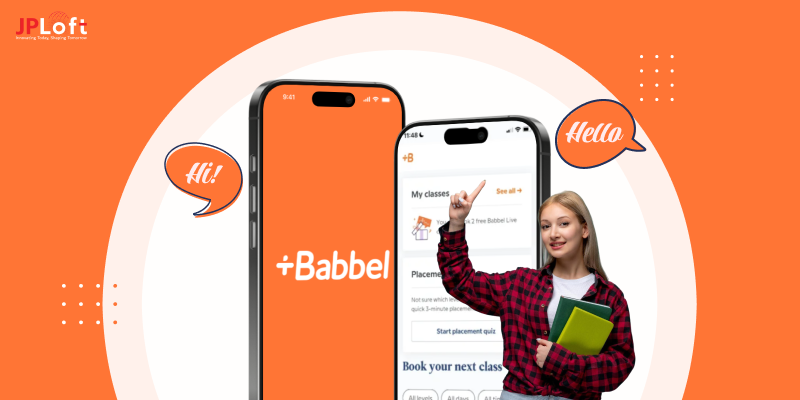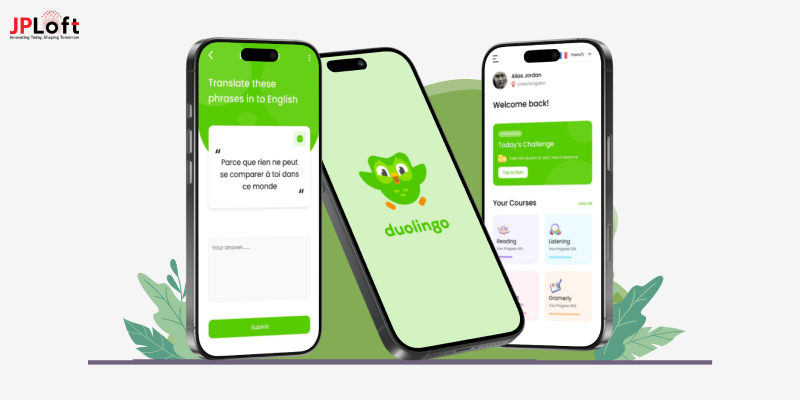Technology has shifted education, making it more interesting, collaborative, and accessible.
Education apps have become very popular and offer new ways for both students and teachers to improve the learning process. These apps, which include virtual classes and personalized learning powered by AI, give you more freedom and ease than old-fashioned ways of learning.
The benefits of education apps extend to both students and teachers, allowing for personalized learning paths, real-time progress tracking, and interactive study materials. These tools can help teachers plan lessons more easily, get the administrative work done automatically, and get their students more involved.
With the growth of e-learning apps, the adoption of digital education solutions has skyrocketed. These apps are now used by schools, colleges, and even professional training programs to help students learn better. The advantages of education apps make them a crucial part of the modern education system, bridging the gap between traditional and digital learning.
How Education Apps Are Changing the Way We Learn?
Technology has completely transformed education, making learning more interactive, accessible, and engaging.
Education apps are playing a huge role in this shift, benefiting both students and teachers. They make learning flexible, fun, and personalized, breaking the limitations of traditional classrooms.
A] Traditional Learning vs. Digital Learning
For years, traditional learning relied on textbooks, classrooms, and face-to-face teaching. While it helped build discipline and direct interaction, it often lacked flexibility.
Every student learns at a different pace, and a one-size-fits-all approach doesn’t always work.
That’s where digital learning comes in. By developing education apps, students can learn at their own speed, revisit lessons anytime, and use interactive tools like videos, quizzes, and live sessions.
Teachers also benefit as they can track student progress, automate assignments, and engage students more effectively. The benefits of education apps for teachers and students are clear, they make learning more personalized and efficient.
B] The Role of Mobile Apps in E-Learning
Mobile apps have taken education to the next level by making learning available anytime, anywhere. Whether it’s a language-learning app, a virtual classroom, or a coding platform, students can learn on the go without being tied to a specific place or schedule.
Some key major education app benefits include:
-
Flexible Learning – Study anytime, anywhere.
-
Interactive Content – Engaging videos, quizzes, and gamified lessons.
-
Personalized Experience – AI-driven recommendations based on progress.
-
Better Tracking – Teachers can monitor student performance in real time.
This convenience has made education apps a favorite among students of all ages, from school kids to working professionals looking to upskill.
C] Education App Usage: What the Numbers Say
Education apps have seen a massive rise in popularity over the past few years. Here are some interesting stats:
-
As of 2023, over 389,000 education apps were available on the Google Play and Apple App Stores. (Source)
-
Duolingo has over 500 million registered users, proving how popular mobile learning has become. (Source)
-
In early 2024, Duolingo was the most downloaded education app, with over 71 million global downloads. (Source)
-
Students using digital learning tools see up to 24.2% improvement in subjects like math, compared to 8.3% with traditional methods. (Source)
These stats clearly show that education apps are not just a trend; they are shaping the future of learning. With their growing popularity, it's safe to say that mobile learning is here to stay!
But how exactly do these apps benefit students or teachers? Let's explore the key e-learning app benefits that enhance learning experiences and make studying more efficient.
Benefits of Education Apps for Students
Education apps have completely changed the way students learn. Gone are the days of carrying heavy books and sticking to strict schedules.
Now, learning is just a tap away! These apps bring fun, flexibility, and efficiency to studies, making them a must-have for students of all ages.
Let’s look at some of the biggest benefits of education apps for students and how they make learning easier.
1. Personalized Learning Experience
Every student learns differently, and education apps understand that.
With AI-powered recommendations and adaptive learning, these apps adjust the content based on a student’s pace and performance. So, whether you're a fast learner or need extra practice, you get lessons tailored to your needs. This makes learning more effective and less frustrating.
2. Interactive & Engaging Content
No more boring textbooks! Education apps use gamification, quizzes, videos, and interactive simulations to make learning fun.
Studies show that students retain more information when learning is engaging. Imagine understanding a complex math problem through a game or learning history through an animated story, it’s way more interesting than traditional learning!
3. 24/7 Learning Accessibility
One of the biggest benefits of mobile learning apps is that you can study anytime, anywhere. Whether you are at home, commuting, or on vacation, your lessons are always with you.
This is especially helpful for students who want to make the most of their free time or those preparing for exams.
4. Self-Paced Learning
Everyone learns at a different speed, and that's okay! With education apps, students can go through lessons at their own pace without feeling pressured.
If a concept is challenging, they can repeat it multiple times. If it's easy, they can move ahead without waiting for others. This flexibility boosts confidence and understanding, making it one of the important benefits of education apps for students.
5. Instant Feedback & Assessment
Education apps provide real-time quizzes, live tests, and AI-driven evaluations, so students don’t have to wait days for their results.
Immediate feedback helps them identify weak areas and improve quickly. This also encourages self-assessment, allowing students to take control of their learning progress.
6. Improved Retention & Understanding
Studies have shown that visual learning and microlearning techniques improve retention.
Education apps break down complex topics into bite-sized lessons with animations, diagrams, and short videos. This makes it easier for students to remember and understand concepts compared to traditional textbooks.
7. Cost-Effective Learning
Hiring a tutor or attending coaching classes can be expensive, but education apps offer a more affordable alternative.
Many apps provide free or budget-friendly courses that offer the same quality education as expensive private tutors. One of the key benefits of education apps for students is that they make learning accessible to everyone, regardless of their financial background.
8. Enhanced Collaboration
Education isn’t just about learning alone, it's also about discussing and sharing ideas.
Many education apps include group discussions, peer learning features, and virtual study groups where students can connect with classmates and exchange knowledge. This social aspect helps in better understanding and teamwork.
Benefits of Education Apps for Teachers
Education apps aren’t just transforming the way students learn, they're also making life easier for teachers. From lesson planning to grading and student progress tracking, these apps help educators work more efficiently while keeping students engaged.
Let’s dive into the major benefits of education apps for teachers and how they’re changing the modern classroom.
1. Efficient Lesson Planning
Gone are the days of spending hours creating lesson plans from scratch.
Education apps come with pre-built modules, resource libraries, and customizable templates, making lesson planning quick and easy. Teachers can focus more on teaching and less on paperwork while ensuring their lessons are well-structured and engaging.
2. Automated Grading & Assessments
Grading stacks of assignments and tests can be time-consuming.
With AI-powered grading systems, teachers can automate the evaluation process. These apps can instantly check quizzes, multiple-choice questions, and even short answers, giving students immediate feedback while saving teachers hours of work. One of the benefits of education apps for teachers is that they streamline grading tasks, allowing educators to focus more on interactive and personalized teaching.
3. Real-Time Student Progress Tracking
Keeping track of each student’s performance is much easier with education apps.
These apps generate detailed analytics and performance reports, helping teachers identify students who may need extra help. With this data-driven approach, educators can personalize their teaching strategies and ensure no student is left behind.
4. Increased Classroom Engagement
A major challenge in traditional teaching is keeping students engaged. Top education apps integrate interactive quizzes, live sessions, multimedia content, and gamified lessons to make learning more fun. When students are actively involved, they retain information better and participate more in class discussions.
5. Time-Saving & Productivity Boost
Administrative tasks like attendance tracking, report generation, and assignment distribution can take up a lot of a teacher’s time.
Education apps automate these tasks, allowing teachers to focus more on actual teaching. This leads to increased productivity and a better work-life balance.
6. Access to a Wider Audience
One of the biggest advantages of education apps is that teachers are no longer limited to a physical classroom.
With online learning platforms, educators can reach students beyond geographical boundaries. This opens up new opportunities, whether it's offering extra classes, conducting online workshops, or even starting an independent teaching business.
7. Secure & Organized Data Management
Managing student records, lesson plans, and other important files can be chaotic.
Cloud-based education apps provide a secure and organized way to store and access data anytime, anywhere. Teachers don’t have to worry about losing important documents, and everything remains neatly categorized for easy reference.
One of the benefits of education apps for teachers is that they help educators streamline lesson planning, automate assessments, and track student progress effortlessly.
Future of Education Apps
Technology is changing the way we learn, and education apps are evolving to offer even better experiences for students and teachers. As new technologies like AI, VR, and blockchain become more common, education apps will become smarter, more interactive, and more secure.
Let’s look at how these advancements will shape the future of education and increase the counts of e-learning app benefits.
► AI & Machine Learning in Education Apps
Artificial intelligence (AI) and machine learning (ML) are improving the personalization and efficiency of educational apps.
These technologies enable applications to analyze how students learn, identify their strengths and limitations, and recommend study resources appropriately.
For example, if a student is struggling with math, the app might suggest more practice problems or video sessions to help them progress. AI-powered chatbots may also help students by addressing their questions immediately, making learning faster and simpler.
► VR/AR for Immersive Learning Experiences
Imagine learning about the solar system by actually exploring planets in a virtual space or understanding human anatomy by seeing a 3D model of the human body.
This is possible with VR and AR. These technologies make education more engaging and interactive by allowing students to experience concepts visually instead of just reading about them.
For subjects like science, history, and geography, VR and AR can create real-world experiences, making learning more fun and memorable.
► Blockchain for Secure Digital Certification
In the future, education apps will use blockchain technology to store and verify academic records securely. Right now, students receive certificates in paper form or PDFs, which can be lost or even faked.
Blockchain ensures that certificates and degrees are tamper-proof and permanently stored online, making it easy for students to share their qualifications with employers or universities without any risk of fraud. This will be especially useful for online learning platforms that offer professional certifications adding to the major education app benefits.
Get a Future-Ready Education App with JPLoft
Looking to create a powerful and engaging education app?
At JPLoft, we specialize in building feature-rich, scalable, and user-friendly e-learning solutions that enhance learning experiences for students and streamline teaching processes. As a leading education app development company, we integrate cutting-edge technologies.
Whether you require an app for schools, colleges, coaching institutions, or corporate training, our skilled developers create tailored solutions to meet your needs.
We provide smooth live lessons, interactive quizzes, offline learning options, and real-time student progress monitoring for a seamless experience.
Wrapping Up
Education apps have transformed how students study and professors educate.
These apps provide a personalized and engaging learning experience by incorporating AI-based recommendations, interactive content, and real-time progress tracking. They break down traditional barriers, making education available to anybody, anywhere, and at any time.
One of the major education app benefits is their ability to adapt to different learning styles, ensuring students grasp concepts effectively while allowing teachers to streamline their teaching methods. As technology continues to advance, the future of education applications seems even more exciting with AI, VR/AR, and blockchain technologies.
If you are a student searching for flexible learning or a teacher trying to improve classroom engagement, education apps provide limitless potential to enhance the learning experience.
FAQs
Education apps offer a personalized learning experience, interactive content, and 24/7 accessibility, allowing students to learn at their own pace and improve retention through engaging methods like quizzes, gamification, and video lessons.
Teachers can use education apps for efficient lesson planning, automated grading, real-time student progress tracking, and interactive teaching methods, making the learning process more engaging and effective
A good education app should include AI-based recommendations, live classes & video lectures, offline learning mode, interactive quizzes & gamification, and multi-language support to enhance user experience.
AI in education apps helps with adaptive learning, personalized recommendations, and automated assessments, making learning more tailored to individual student needs.
The future of education apps includes AI-driven learning, VR/AR for immersive experiences, and blockchain for secure digital certification, making education more engaging, accessible, and efficient.














Share this blog